No products in the cart.
Hearing and Vision
Hearing Loss, Usher Syndrome, and Hope
As an Audiologist and mother of a child diagnosed with Usher Syndrome, my eyes have been opened to a community I never knew existed. When my son was diagnosed with hearing loss, we were devastated and thought his hearing loss would be our biggest battle.
After getting past the grief associated with my son’s hearing loss diagnosis, I decided to go back to school to get my doctorate degree in audiology. When studying for my doctorate, we studied syndromes that were associated with hearing loss. I remember thinking, I’m so glad Brenden just has a hearing loss. I didn’t realize we would soon be facing another devastating diagnosis of blindness when he turned 13.
According to the Foundation Fighting Blindness, Usher Syndrome affects about 25,000 people in the United States. Usher Syndrome is an inherited condition that causes both hearing loss and vision loss. It affects both the cochlea and retina.
This syndrome is passed down from parents to their children, meaning that both parents need to have a copy of the mutated gene for the child to end up with Usher Syndrome. Unfortunately, my ex-husband and I both had that rare genetic mutation without knowing it and passed it on to our boys. Brenden, our oldest, ended up being the unfortunate recipient of this genetic mutation.
Our youngest son, Ian, by pure chance, was able to avoid the same mutation but is now considered a carrier.
Types of Usher Syndrome
There are three different types of Usher Syndrome. The vision loss is caused by Retinitis Pigmentosa (RP), which results in tunnel vision or total blindness.
- Type 1 Usher children are usually born with severe hearing loss and experience problems with balance. Many of these children are now receiving cochlear implants at a young age. Cochlear implants allow them to receive access to speech and language and help them to maximize their auditory system in order to prepare them for when they may need to rely solely on their hearing.
- Type 2 Usher children are born with moderate to severe hearing loss and the symptoms of vision loss start quickly after adolescence. In most cases of Usher Type 2, vision loss progresses at a slower rate and hearing tends to remain stable.
- Type 3 Usher children are usually born with good hearing or mild hearing loss and their vision loss starts around puberty.
Thanks to technology, we are now able to identify children as early as newborns with hearing loss. Genetic testing is not always covered by insurance, so many of these children with Usher Syndrome are not diagnosed as quickly as they could be.
My son had basic genetic testing done as a young child to rule out the most common hearing loss genes. Usher Syndrome was not one of the genetic mutations they were testing him for, and the hearing loss etiology was inconclusive.
Signs of Retinitis Pigmentosa (RP)
In the early stages RP, individuals may just appear clumsy and run into things. Prior to my son’s diagnosis, we just thought his clumsiness was associated with puberty. We had no idea that he had been viewing the world through straws without much peripheral vision.
While living in Colorado completing my externship year for Audiology, I decided to take my son, Brenden, to Children’s Hospital to see their ophthalmologist. After doing the same eye chart testing he had done multiple times before, the ophthalmologist did not feel that he had any vision problems. I practically begged her to do a full eye exam because I suspected he had Usher Syndrome.
She decided to go ahead and order the ERG but assured me she didn’t think he had it.
When the testing was finished, the doctor verified that my suspicions were correct, and Brenden definitely had RP. She also reported that he was already in the most severe stages of RP and would need to start learning to use a white cane and learning braille immediately. Even though I had suspected that he had Usher Syndrome, the diagnosis floored me.
I was shocked to learn how bad the vision loss had already progressed and was devastated again.
Learning to Cope
Having a child diagnosed with Usher Syndrome made me realize how little I knew about the Deaf-blind community, even as an Audiologist. As audiologists, even though we focus on treating hearing loss, we rarely encounter individuals with Usher Syndrome.
Many people who hear the term ‘Deaf-blind’ think of someone like Helen Keller. People who are classified as deaf-blind can still function with hearing aids, cochlear implants, or tactile sign language, but need other resources and support.
Most individuals with RP will need to use a white cane and other low vision aids, but they can work and function like everyone else. With the assistance of technology, they can lead normal and happy lives.
Our goal for Brenden was to help give him all of the resources he would need in order to adapt to his new challenges and help him to live life to its fullest.
Most people with hearing loss know they need to sit closer to the sound source or stand close to someone when they are speaking in order to hear them. This is especially important in noisy environments.
With retinitis pigmentosa, it is the opposite. Individuals with RP usually do better if they stand farther back or sit in the back of the room to help them see more. Most lose their peripheral vision but still keep some central vision. Having both impairments is very problematic for communication, but technology has made life easier for those with Usher Syndrome.
Advancements in Hearing Devices
In the past, without technology, things were very different. Children who were born deaf were taught sign language and were able to function and communicate with visual communication in the Deaf Community. Once the vision loss progressed to the point they could not see, they were forced to use tactile sign language as their main form of communication. Without technology, their world became much smaller.
With technology today, we are able to identify hearing loss at birth. With genetic testing, we are able to diagnose Usher Syndrome early. Early diagnosis helps to prepare these children and their parents for the challenges they will face as they grow up.
There have been so many advancements in hearing technology and low vision technology that the world is getting so much bigger for individuals with dual sensory impairments.
Hearing Aids and Cochlear Implants
Hearing aids and cochlear implants have drastically changed the lives of those with Usher Syndrome
Hearing aid companies like ReSound and Oticon offer hearing aids that directly connect to the iPhone and Apple Watch. This is AMAZING for those who live with Usher Syndrome. This hearing technology allows anyone with hearing loss to be able to stream their phone calls directly to their hearing aids and listen to music through their hearing devices.
Bluetooth hearing aid technology has allowed for those with Usher Syndrome to stream GPS instructions from their iPhone or Apple watch directly to their hearing aids. This direct streaming lets them know how many steps to take in a certain direction to get to where they need to be.
Cochlear, one of the largest cochlear implant companies in the world, now has a direct to iPhone cochlear processor called the Nucleus 7. This device allows individuals with Usher Syndrome who use cochlear implants to be able to obtain the same information directly to their sound processor. This was never heard of before with cochlear implants.
Most of these companies also offer accessory devices in addition to the hearing devices that enhance and improve the sound quality even more for speech and television. Technology truly is amazing.
Helpful Resources for Usher Syndrome
Even as an audiologist, I was at a loss for information related to Usher Syndrome. I was mentally struggling to come to terms with the future we faced and the challenges that come with the diagnosis. The following links are a list that I have compiled for services and programs related to Usher Syndrome:
- ICanConnect.org provides individuals with vision loss and hearing loss free equipment and training.
- Vocational Rehabilitation Services are also available to help individuals with hearing loss and vision loss gain access to more so they can get the training they need to live their lives to the fullest. Many Vocational Rehab Service Centers help cover the cost of the hearing devices and help pay for college tuition for individuals who have dual sensory impairments. They also help to cover the cost of training at different facilities.
- Helen Keller National Center is another great resource and campus that teaches individuals with hearing loss and vision loss job skills, independent living skills, and puts them in touch with others in the community that are just like them. They have residential and summer programs for teens and adults who are facing the diagnosis and need to learn how to function independently
- Foundation Fighting Blindness
- Usher Coalition
- Foundation for Blind Children
- National Federation of the Blind
- FamilyConnect.org
There is no cure for Usher Syndrome, however, the research that is currently underway is promising to those diagnosed with this disease.
Hearing Loss, Usher Syndrome, and Hope
Brenden has come a long way since being diagnosed at birth with hearing loss. Throughout elementary education, it seemed like he was always behind his grade level for language and writing. We were always trying to catch up.
By the time he reached the 6th grade, Brenden was finally at grade level for academics and was starting to surpass kids his age. At age 13, he was diagnosed with vision loss and started training for braille and white cane use. He was able to attend blind camps and meet children his age going through the same diagnosis. This really helped him to find happiness within himself and accept the cane.
In high school, even with the hearing loss and vision loss, he played piano and percussion for the honors bands and received numerous awards for academics and musical talent. He participated in the marching band his senior year playing the marimba and has a wonderful group of friends who helped him get through his high school years.
Despite all of the obstacles he has faced, Brenden still pushed himself in academia and took all honors and advanced placement courses in high school. He graduated with a 3.9 GPA and received multiple scholarships for academics toward college.
After graduation, Brenden auditioned for the piano performance program at Grand Canyon University and was accepted into their program. He plans to live on campus this fall to pursue his passion for music.
Brenden is living proof that even facing the most devastating diagnosis, there is always a way to find hope and happiness. We are so grateful for modern technology and the ability to diagnose hearing loss at birth. If it wasn’t for hearing aids, Brenden would have never had the opportunity to hear music and find his passion for piano.
Brenden is the happiest and most positive human being you will ever meet. He has faced Usher Syndrome with so much faith, courage, and positivity.
As a parent, I have learned that we cannot limit our children from pursuing their dreams because we are scared of the unknowns.
As an audiologist, I have learned that we need to help educate parents and those who are receiving the diagnosis of Usher to know they are not alone and that there are many people living happy and successful lives with vision loss and hearing loss.
A Message From Brenden

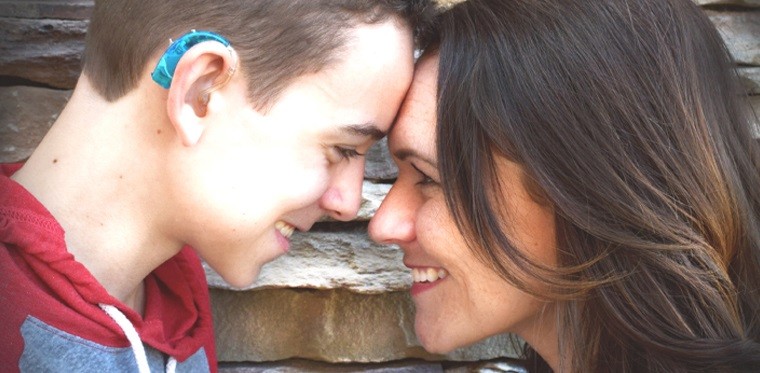
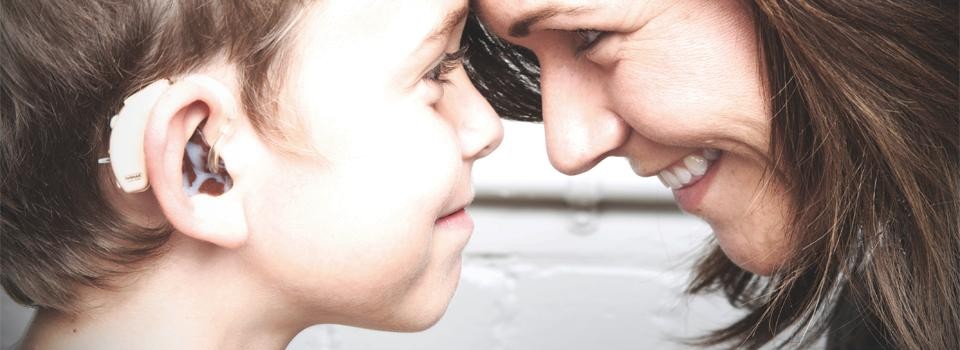

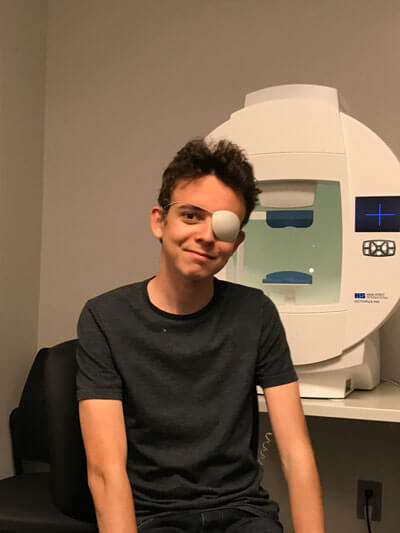
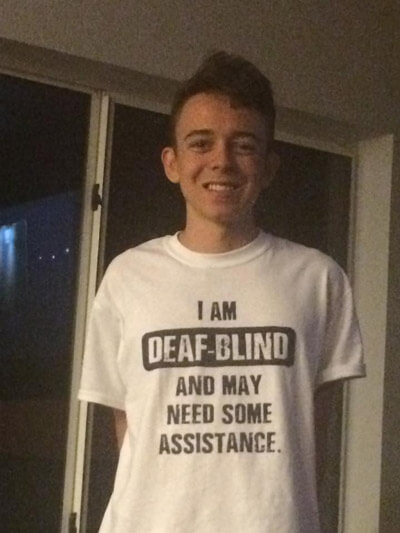
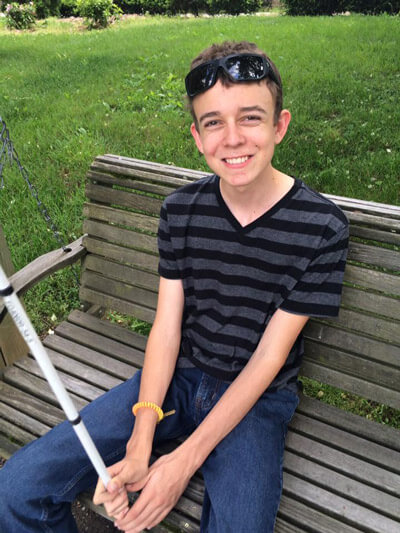

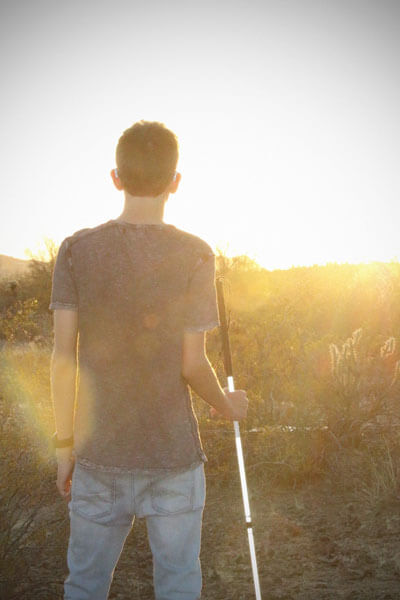
Pingback: Hearing Loss Due To Usher Syndrome Treated At Happy Ears Hearing Center | SproutNews
Pingback: Deaf Awareness Spotlight - Dr. Matthew Wetmore